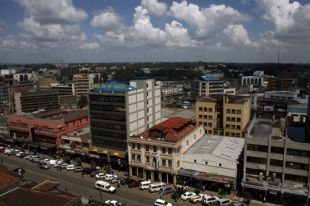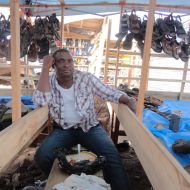Black-Market Electronics Keep a City’s Unemployed Youth Flush With Cash

Nairobi’s stolen-electronics dealers work in the back alleys of slums, but some of their merchandise makes its way into the city’s shopping districts. Photo credit: Stefan Magdalinski via Flickr
James makes his living selling electronics in Nairobi. He works eight hours a day, plus weekends if he has customers, to support his wife and their young child. He has suppliers from the across the city who specialize in laptops, mobiles, or smart phones, and a list of clients he can call on a moment’s notice when he gets a new shipment in.
But James, 26, who’s been working here for two years, doesn’t run a typical electronics shop. His office is a wooden stool underneath an umbrella in a back alley in the slum of Mathare. He shares the narrow lane with drug addicts huddled on dirty mattresses. He won’t do business in the open, and only spoke to me behind a wooden wall by a nearby restaurant.
That’s because everything James sells is stolen.
James (not his real name) is one of tens of thousands of unemployed youth in Nairobi who are forced to get by however they can, some turning to crime. In Kenya, about 40 percent of the workforce is jobless, with urban youth hit especially hard. In Nairobi, petty theft is common, enough to earn the city its notorious nickname, “Nai-robbery.” Indeed, I met James because my own laptop had been stolen recently, and I decided to ask around about it, hoping it would turn up on the black market.
“We buy from hustlers like us, thieves,” James told me. Most of his merchandise comes from the addicts in the alley who steal to pay for their habits. “They take phones they snatch [from people on the street]. They give to us at a low price. We sell, and we get our daily bread.”
Basic mobiles, not smart phones, form the foundation of James’s business. He buys them for about 500 shillings ($5.75 USD) apiece and resells them for 700 ($9). That’s because in informal settlements, most customers can’t afford the flashier models. But big-ticket items like smart phones, laptops and TVs do make their way into the system, supplied by middle-class Nairobians.
Jackson, 32, is another phone dealer who works in the alley. I showed him my mobile, a small Samsung Pocket smartphone, a little beat up, that I bought new for 10,000 shillings ($115).
“This one has some scratches,” said Jackson, the soft-spoken elder of the phone dealers. “So we buy for 3,000 ($35), sell at 4,000 or 4,500 ($46 or $50).” He said they might buy it for 4,000 and sell it for 5,000 ($58) if it was in better condition. More expensive phones, like an iPhone or Samsung Galaxy, can mean even higher profit margins, maybe costing them 10,000 shillings ($115) and re-selling for 14,000 ($150).
Since locals can’t afford such prices, they take this merchandise to downtown Nairobi’s electronics shops on Moi Avenue, one of the city’s busiest streets. There, serial numbers are altered and the goods are repackaged as “used.” TVs and video-game systems might stay here in Mathare, though, sold to movie and gaming halls run by other enterprising youth.

Moi Avenue in Nairobi. Photo credit: DEMOSH via Flickr Creative Commons
But such big sales are rare, and the downtown dealers aren’t always reliable. “Maybe you’ve bought at 16,000 ($190), you go to sell in town, and they buy at 10,000 ($150),” said James. “Sometimes you take that big loss.”
James did well last week though, selling four smart phones and pocketing 10,000 shillings ($115). Another colleague, Eddy, 23, only made 1,000 shillings ($11.50) off ten normal phones and a handful of memory cards.
Despite the inconsistent market, Eddy, James and Jackson make a decent living. Jackson wore a sharp button-down shirt when I met him, Eddy a new denim jacket. The three sported fresh sneakers, and are accustomed to eating nyama choma, a relatively expensive dish of grilled meat.
But they could be doing better. Eddy dropped out of college because he couldn’t pay the fees. James was once a phone technician with a shop in a mall, but he closed down because of rising rent. Jackson lost his job as a security guard during the economic crisis four-and-a-half years ago. As the formal system failed each of them, they turned to the city’s vast black-market economy.
Jackson said he likes his pilfered electronics job, laughing when he says he’s accumulated four-and-a-half years’ experience as a salesman of stolen goods. He’s able to pay school fees for his two children, and can afford to take them to Uhuru Park for Sunday picnics.
Eddy, however, who had made a bid for college, was less enthusiastic. “I’m just doing it because I don’t have any alternative,” he said. He recently enrolled in a free driving course, paid for by a candidate during Kenya’s elections in March, and hopes to get hired as a commercial driver once he earns his license.
There are about twenty other dealers in their alley, so competition is high. When one gets a smart phone he keeps it secret for fear of jealous associates. But Jackson, James and Eddy sometimes work together. If an iPhone comes in and no one has enough cash to buy it, they pool their money and split the profits.
As we talked, the three peered around the wooden wall every few minutes to scout for police, but they said they never worry about jail. “If a policeman come around here and see you, he’ll charge you 10,000 ($112),” said Eddy. “He or she won’t take you to the police station.”
“The police are a business too,” added James.
Just in case, though, they erase all personal data and tracking software from the phones they buy. James, the former phone technician, flipped open a smartphone he was trying to sell, typed in a password and wiped the memory clean. “I only remove the battery and do my magic,” he said with a smile.
And if they suspect a phone was taken in a violent robbery, they never put their own sim cards in it—which in Kenya must be registered with an ID number—to avoid being tracked themselves.
Do they feel bad about dealing goods someone might have been killed for? “No,” said Jackson. “Even if I don’t buy it, they will,” he added, pointing to the other two.
James had his own way of dealing with the guilt. “I go to church and repent,” he said. “I’m still buying theft phones. That is a sin.”
They said they hadn’t seen my laptop, and suspected it was taken directly to Moi Avenue where it could fetch 22,000 shillings ($260), a huge take. Still, James cautioned that such windfalls are fleeting.
“You can get that profit,” he said. “But at another week you can’t get anything.”









